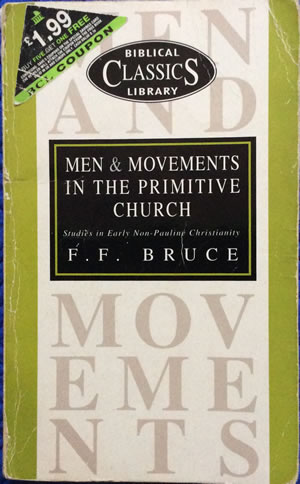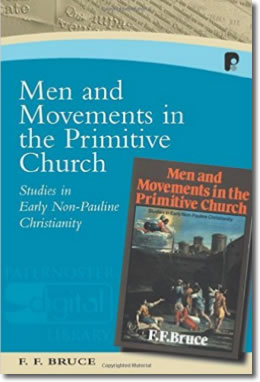Book Review: F.F. Bruce
Pagan Christianity, by Frank Viola
Retrieving the Tradition & Renewing Evangelicalism, by D.H. Williams
CH101 Interview of D.H. Williams
Primitive Christianity and the New Testament
Did Jesus Exist?, by Bart Ehrman
Peter, Paul & Mary, by Bart Ehrman
Lost Christianities, by Bart Ehrman
A History of the Early Church, by Hans Lietzmann
Men and Movements, by F.F. Bruce
Will the Real Heretics Please Stand Up, by David Bercot
A Dictionary of Early Christian Beliefs, by David Bercot
The Doctrine of the Trinity, by Anthony Buzzard
The Christian's Secret to a Happy Life, by Hannah W. Smith
Flea Market Jesus, by Arthur Farnsley II
Movie Review: End of the Spear
Men and Movements in the Primitive Church: Studies in Early Non-Pauline Christianity, by F.F. Bruce
F.F. Bruce (Frederick Fyvie Bruce) has been one of my favorite scholars for more than 25 years, going back prior to my academic work. I had seen numerous citations and extended quotes from Bruce in commentaries I had used - his comments were always instructive.
In my own NT studies I had started seeing nuance comparing Pauline writings to NT Acts and developing some theories that were not well voiced or supported in the evangelical
commentaries I used. In my PhD studies I was searching for texts that would address some of my ideas...and there in the St Andrews library was "Men and Movements" by F.F. Bruce.
This little 150 page booklet is loaded with great information, excellent footnotes pointing to academic writings and primary source documents, and is written in the
style of a great scholar. I had three excellent F.F. Bruce works in my bibliography - of these "Men and Movements" was the most important for my work.
Early in my studies my supervisor told me that to learn how to be a good scholar I needed to read good scholars: "The best scholars are the easiest to read and understand." What
great advice! F.F. Bruce is such a scholar. In this little volume many of my thoughts and questions were either answered or provoked with good data and more good studies for research.
Chapter 1 covers the role of Peter. Bruce's work on "kephas" and "petros" is excellent and more important than most evangelical pastors can imagine. Paul uses the Aramaic Cephas almost exclusively, indicating his support of Peter as the leader (p.17. Could this be a subtle move to say that James is NOT the most important leader?). Bruce does not shy away from the conflict between the apostolic leaders. This is a critical part of the development of the primitive church - it appears to me that conservatives/evangelicals consistently try to paper over these issues which does not do justice to the data we have and, as a good scholar, Bruce deals with it judiciously.
Chapter 2 covers the critical topic of Hellenists in primitive Christianity which led to complications and conflicts. Acts 6 introduces the Hellenists in the NT, but for the 200 year history of Judea prior to the New Testament era one must go to other sources (Maccabees and Josephus).
Bruce touches on the historical backdrop. I would have preferred that he go into further detail on this point. He could have extended his single paragraph in the middle of page 50 into just 2-3 additional paragraphs that would have helped (You can read a summary of the "Hellenization" in Palestine that included Judea). It is interesting, given the history of Syria under the Seleucid Empire, that Antioch was where the Gentile mission was birthed. This was surely part of the background racial noise that trickled into the primitive church.
Bruce does spend a good deal of time on the issue "hellenism" in the primitive Christian movement, beginning in this second chapter. The influence of Stephen, the deprecated view of the Temple among Hellenistic Jews, Stephen's death and the dispersion of Hellenistic Jewish Christians are all covered in this chapter. Bruce presents the view that the great persecution against the church reported in Acts 8:1 is actually ONLY against the Hellenistic Jewish Christians who are chased out of Jerusalem, "...the church in Jerusalem became predominately 'Hebrew' in composition." (p.58)
I think Bruce is correct on this point. This represents the beginning of a continued struggle in the primitive church with the "Hebrew" speaking Jewish Christians not being favorable with Greek speaking Jewish Christians who did not follow the Law of Moses, Gentile Christians, and with a tendancy to stay isolated in an "us vs them" mentality.
Finally, Bruce does a great job of presenting the Hellenized/Alexandrian/Egyptian influences in primitive Christianity: NT Hebrews, Letter of Barnabas, and Apollos in Acts/1 Corinthians. This text was written in 1979. In 1987 Bruce published an excellent article "To the Hebrews": A Document of Roman Christianity? in Aufstieg und Niedergang [ANRW 25.4] in which he lays out the evidence for Alexandrian authorship of the NT letter "To the Hebrews." This is another pointer to the influence of Hellenization in the primitive church and different from the Jerusalem leadership.
Chapter 3 covers the influence of James, the brother of Jesus. There is a great section in this chapter where Bruce's adroit exegesis is on display as he shows how the text cited in Acts 15 comes from the Septuagint. Bruce correctly questions whether James would truly use the LXX in an argument presented to the conservative Jewish leadership.
He covers most if not all of the early traditions regarding James with the admission that much is legendary. In the end we have the Jewish strain of early Christianity known by the second and third century fathers as Ebionites. We know this tradition through NT James, references made in Gnostic gospels and what is called the Pseudo-Clementine literature. We cannot know for certain that this strain has a direct link to James, but they certainly claimed him as their source.
Chapter 4 is on John and what NT scholars called the "Johannine community." Again, Bruce does a splendid job of giving the reader a concise summary of both the historical evidence AND the traditions/legends of John's history and writings.
Bruce begins the chapter by stating the bulk of our evidence in Ephesus points to the Johannine tradition even though we have NT Ephesians with the tradition of Paul. Bruce shows hints from the NT that points to a Pauline influence that falls away to the Johannine tradition (p.122). He then covers the theories of which "John" may have written the NT Johannine documents, showing the conflicting evidence from the ancient sources. Ultimately Bruce agrees that which specific man authored which particular document is not as important as the overarching Johannine tradition which represented a non-Pauline strain in the primitive church.
Conclusion
The focus of this text is to give the reader a sense of the diversity in the primitive church. Bruce admits to being a Paul guy (p.42), yet this text gives NT readers a better historical understanding of the non-Pauline traditions. I am also a "Paul guy." For a serious NT reader, this text by F.F. Bruce is indispensable. If you want to properly understand Paul, you need to understand historical context. This text does the job.
As a testament to the serious scholarship of F.F. Bruce I did a quick survey of texts on my puny shelf and found him cited in several works. In addition I have his commentaries on Romans and Acts.
R.A. Baker
Ph.D. Ecclesiastical History

Questions, Comments or Criticisms:
You can send an email to directly to me Al Baker, CH101.
CH101 retains the right to edit and post comments/questions unless you specifically ask that your comments NOT be posted. Comments that are personal or private are never posted...only questions about Church History, the Bible, etc.
Questions/Answers
-
was athanasius black
-
tertullian/paul/marcion
-
worship on sunday
-
origen and universalism
-
water baptism
-
wine in ancient world
-
fathers on NT Revelation
-
fathers on holiness
-
fathers on the military
-
apostolic succession
-
palestine or israel?
-
candles in church
-
pagan influences
-
constantine-Sun worship
-
constantine vs donatists
Book Reviews
- church traditions
- book reviews
- Buzzard - the Trinity
- David Bercot books
Biblical Issues
-
what is false doctrine?
-
pacifism and the NT
-
who wrote NT Hebrews
- the trinity
- the apocrypha
- NT, faith, resurrection
- NT and tithing
- Is the NT inspired?
- wine in the bible
Culture and Opinion
- christian tolerance
- faith and certainty
- PragerU - Canada
- end of the spear
ist Century Church History
The conversion of the apostle Paul
Early Church History of Galatians
James Just brother of Jesus in the Bible
1st Century Christian Church Struggles
Christian History - conversion Apostle Paul
Palestine - Philo, Josephus, Strabo, Aristotle
Apollos NT Hebrews in Ancient Rome
Apollos NT Hebrews in the Bible
Wine in Bible Alcoholic?
James the Just and Jesus in the Bible
Hellenized Jews Gentile Christians
Hellenized Jews New Testament
Jews and the conversion of the apostle Paul
Conflict in the Early Christian Church
Palestine vs Israel Zola Levitt Dr. McCall
Palestine in the Bible and the Ancient World
Apollos NT Hebrews in the Bible
Apollos NT Hebrews - Ancient Roman World
Palestine Israel in Ancient Greece Rome
Alcoholic Wine - New Testament
James the Just Paul and Jesus in the NT
How the New Testament was formed
How the NT Canon was formed or canonized
Questions about Wine in the Ancient World
Wine Alcohol in the Bible - New Testament
Early Church Catechesis - Catechetical Training
Questions regarding Christian Issues
Palestine - Israel Map Ancient World
Apollos Alexandria Hebrews in the Bible
Apollos Paul Corinthians - Bible
James the Just the brother of Jesus
1st Century Persecution of Christians
Gnosticism in the 1st Century Early Church
Early Church History of Galations
Early Christianity War and Conflict
Early Christianity Constantine and War
Important Issues in Early Christianity
Palestine Israel in Greek Roman World
Apollos Alexandria Hebrews - Bible
Apollos Paul Corinthians NT
go

